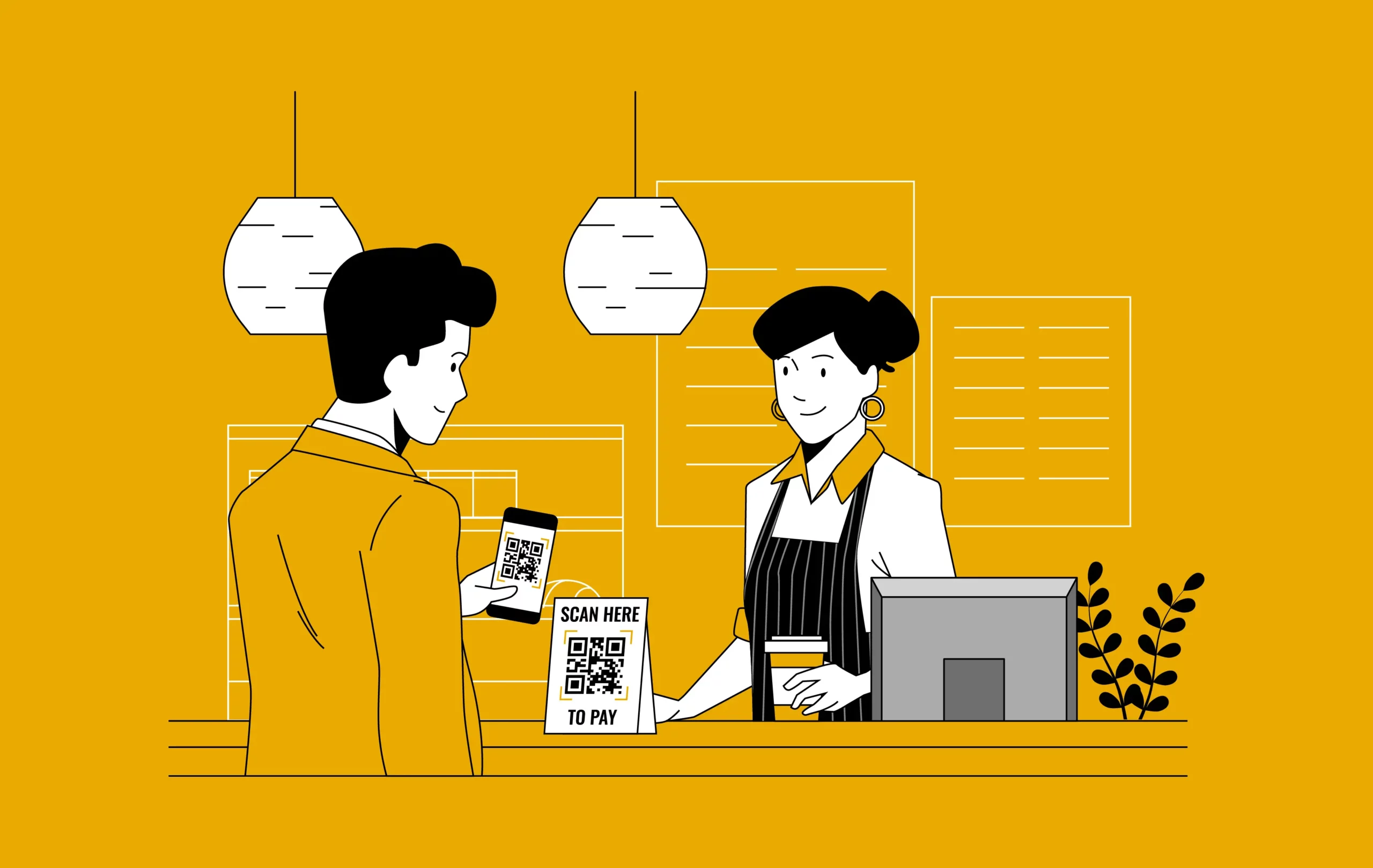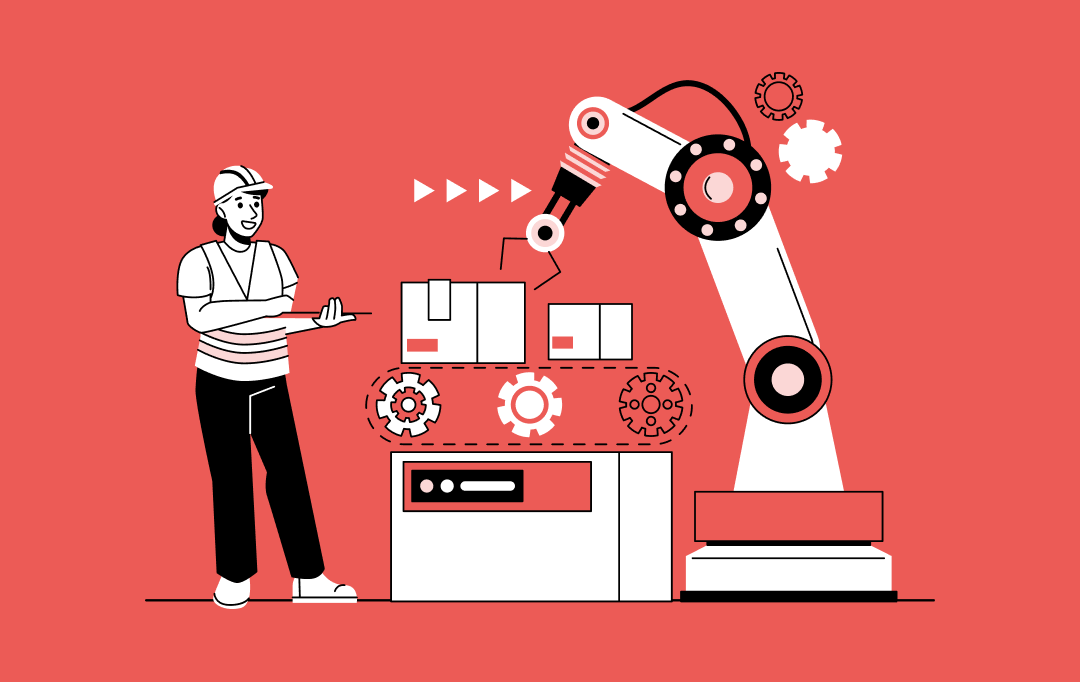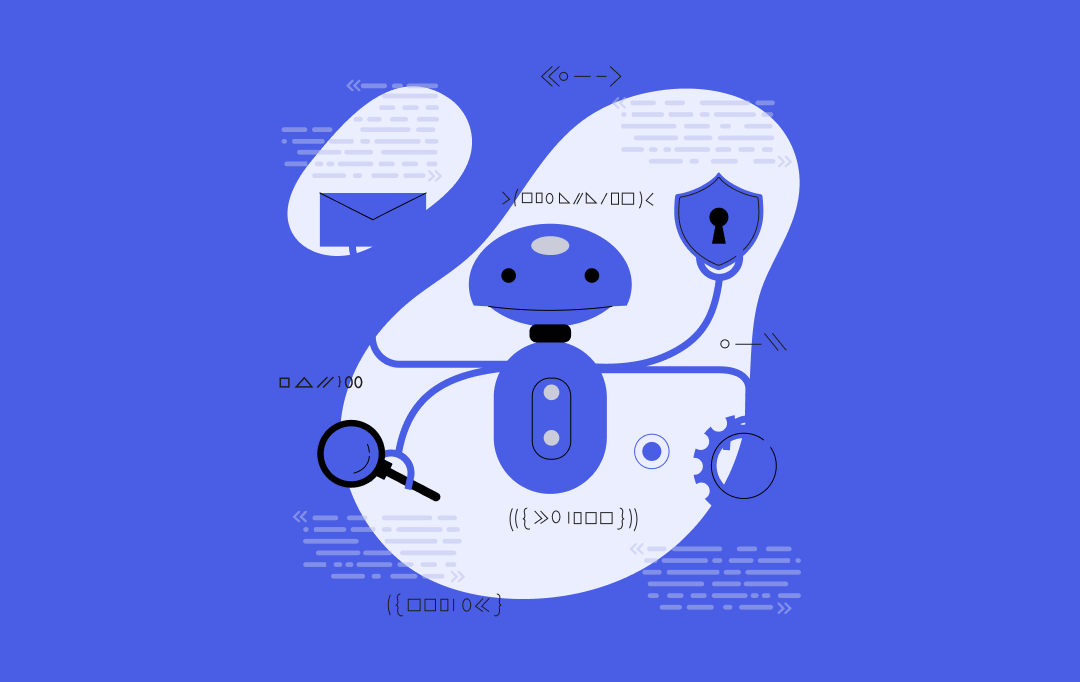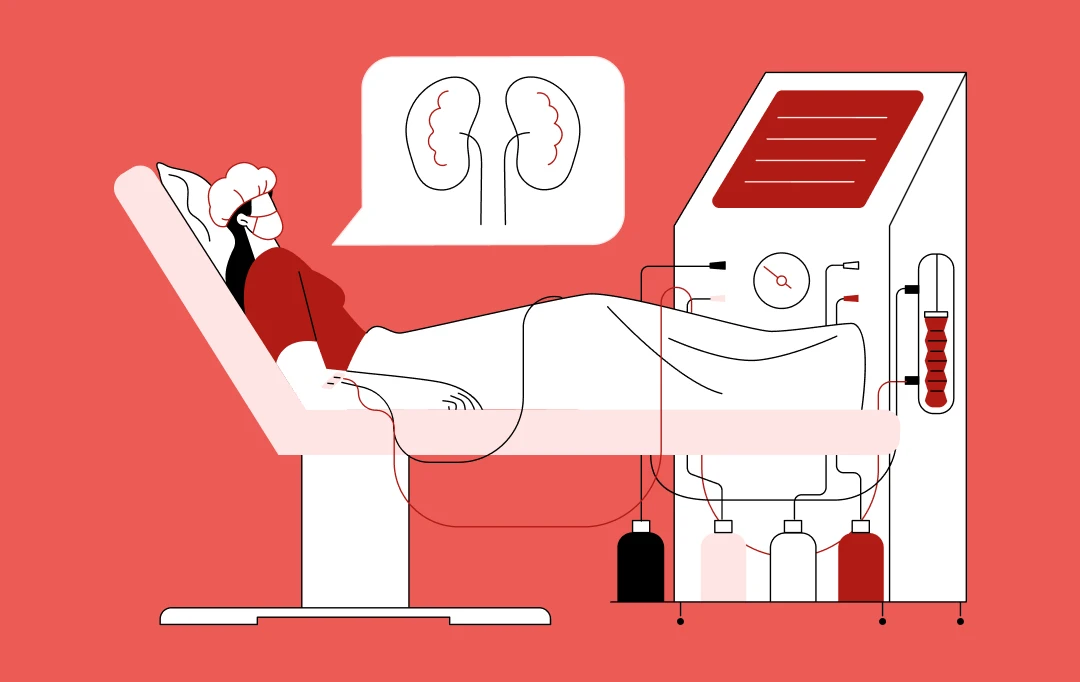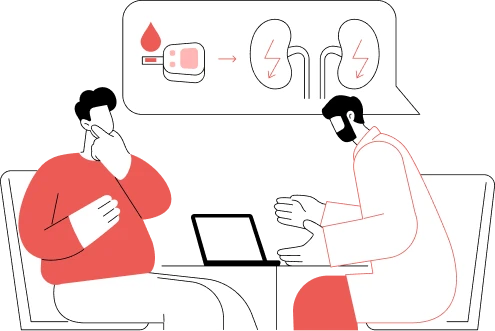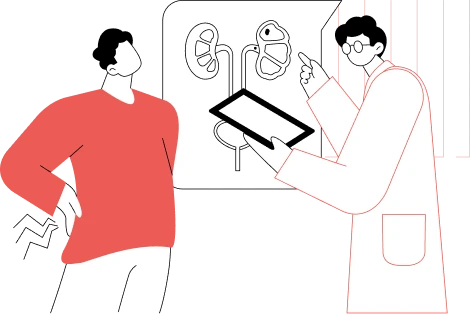- The Role of AI-Powered Assistants in Healthcare: How They Work
- AI Virtual Health Assistants in Remote Patient Monitoring: Top Use Cases & Benefits
- 24/7 Real-Time Patient Engagement
- Early Detection of Health Issues
- Personalized Health Guidance
- Reduced Clinician Workload
- Improved Patient Compliance
- Cost-Effective Care Delivery
- Data-Driven Clinical Decisions
- Greater Accessibility & Health Equity
- Top Real-Life Examples of AI-Powered Virtual Healthcare
- Health-e-People's Unified Health Ecosystem for Users, Caregivers & Researchers
- Livongo's Personalized Health Recommendations
- Mayo Clinic's AI-Powered Chatbot for Patient Interaction
- Omada Health's Chronic Disease Management Platform
- Ada Health's Telemedicine Assistance
- Woebot Health's Mental Health Support System
- Zocdoc's Automated Administrative Task System
- Pillo Health's Medication Management System
- Challenges of Implementing Virtual Health Assistants in Remote Patient Monitoring
- Data Privacy and Security Concerns
- Integration with Existing Systems
- Patient Engagement and Adoption
- Accuracy of AI Predictions and Health Monitoring
- Regulatory and Compliance Challenges
- The Future of AI-Powered Virtual Health Assistants
- Implement Virtual Health Assistants in Your Healthcare System with Appinventiv
- FAQs
Key takeaways:
- Remote patient monitoring has the potential to reduce hospital readmissions by up to a quarter, shifting healthcare from reactive to proactive care through continuous, real-time health tracking.
- The U.S. health intelligent virtual assistant market is expected to reach $1.87 billion by 2030, driven by the growing demand for continuous care, virtual consultations, and AI-driven healthcare automation.
- AI virtual health assistants provide continuous, real-time engagement, improving patient compliance with medication and health regimens.
- By reducing unnecessary hospital visits and offering early interventions at home, AI-powered virtual assistants help lower healthcare costs while maintaining quality care.
This might surprise you, but did you know that remote patient monitoring can cut hospital readmissions by a quarter? A McKinsey survey found that we could shift over 50 million yearly doctor visits to virtual consultations if telemedicine adoption spread evenly across all patient groups. These aren’t just impressive numbers; they signal a complete transformation in how we access, manage, and deliver healthcare.
This transformation hits hardest for people managing chronic conditions. Continuous monitoring often determines whether someone stays stable at home or ends up back in the hospital. Healthcare providers now utilize connected technologies to track vital signs, medication compliance, lifestyle habits, and early warning signs, all of which occur in real-time. The outcome? We’re moving from reactive emergency responses to proactive, personalized care guided by actual data.
The U.S health intelligent virtual assistant market is expected to reach a valuation of $1,874.2 million by 2030, fueled by the rising demand for continuous care, virtual consultations, and AI-driven healthcare automation. (Source: GVR)
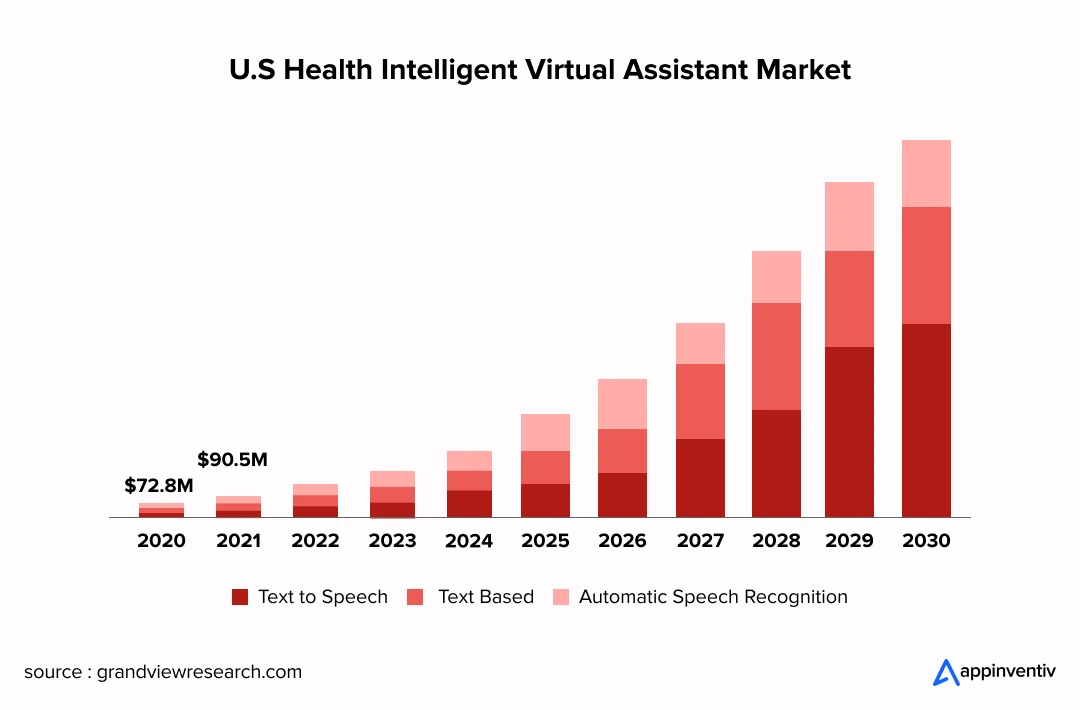
This indicated how the impact of such virtual assistants goes beyond clinical metrics. Patients gain real control over their health journey. Geographic boundaries, scheduling conflicts, and rigid appointment systems no longer stand in their way. Users can modify treatments, make informed choices, and receive support exactly when they need it, not weeks later.
For healthcare providers, RPM becomes a strategic advantage, especially with AI integration. It streamlines patient management, eases operational pressure, and expands care access while maintaining quality standards. As the healthcare sector grows increasingly complex, intelligent automation and virtual care aren’t nice-to-have features—they’re absolute necessities.
This blog examines how AI-powered virtual health assistants are revolutionizing remote patient monitoring. We’ll cover patient engagement improvements, better outcomes, real-world applications, core benefits, implementation hurdles, and future possibilities. Consider this your comprehensive guide to where AI meets virtual care.
Don’t wait, collaborate with us to lead the change in remote patient care.
The Role of AI-Powered Assistants in Healthcare: How They Work
Virtual health assistants have transformed healthcare by providing continuous monitoring and personalized care recommendations. These systems track vital signs, integrate data from multiple sources, and help doctors detect problems early, reducing hospital readmissions and improving patient outcomes.
For people with chronic conditions, they offer 24/7 support that’s both accessible and cost-effective. By empowering patients to actively manage their health while giving providers better insights, these assistants are making healthcare more efficient and tailored to individual needs.
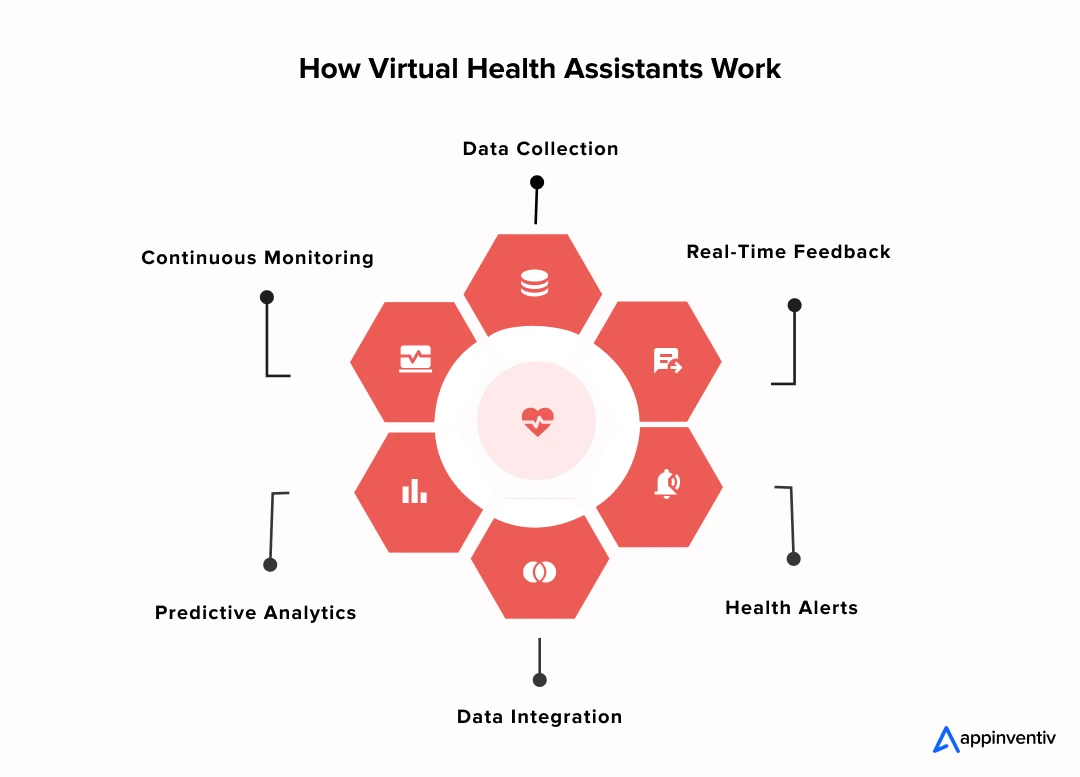
Here’s how virtual health assistants work:
Data Collection: These systems pull real-time information from health monitoring devices, everything from fitness trackers on your wrist to blood pressure cuffs at home and health apps on your phone.
Health Metrics Monitoring: The assistants keep constant watch over vital signs, including heart rate, blood pressure, glucose readings, and daily activity levels, providing round-the-clock oversight of patient health.
Real-Time Feedback: Patients and their doctors receive immediate insights about health metrics, complete with practical recommendations based on current readings and trends.
Personalized Reminders: The system sends customized prompts for medication schedules, exercise routines, and upcoming appointments, helping patients maintain their treatment regimens without missing important steps.
Health Alerts: When the system detects concerning changes or unusual patterns in health data, it immediately notifies both patients and their healthcare teams, enabling quick response to potential problems.
Data Integration: Multiple data streams from various devices and applications get combined into one comprehensive platform, giving healthcare providers a complete picture of each patient’s health status.
Predictive Analytics: Advanced virtual assistants utilize predictive analytics to examine patterns in collected data and identify potential health risks before they become serious problems, enabling doctors to intervene early rather than react to emergencies.
Continuous Monitoring: These systems provide 24/7 surveillance, reducing the number of office visits patients need while ensuring medical support remains available whenever situations arise.
AI Virtual Health Assistants in Remote Patient Monitoring: Top Use Cases & Benefits
AI virtual health assistants are changing the game for patient monitoring beyond hospital walls. These smart systems function continuously without interruption; they’re constantly reviewing patient information, sending helpful reminders, and flagging healthcare teams when someone needs attention. Let’s explore how this works through the key use cases of AI-powered virtual healthcare.
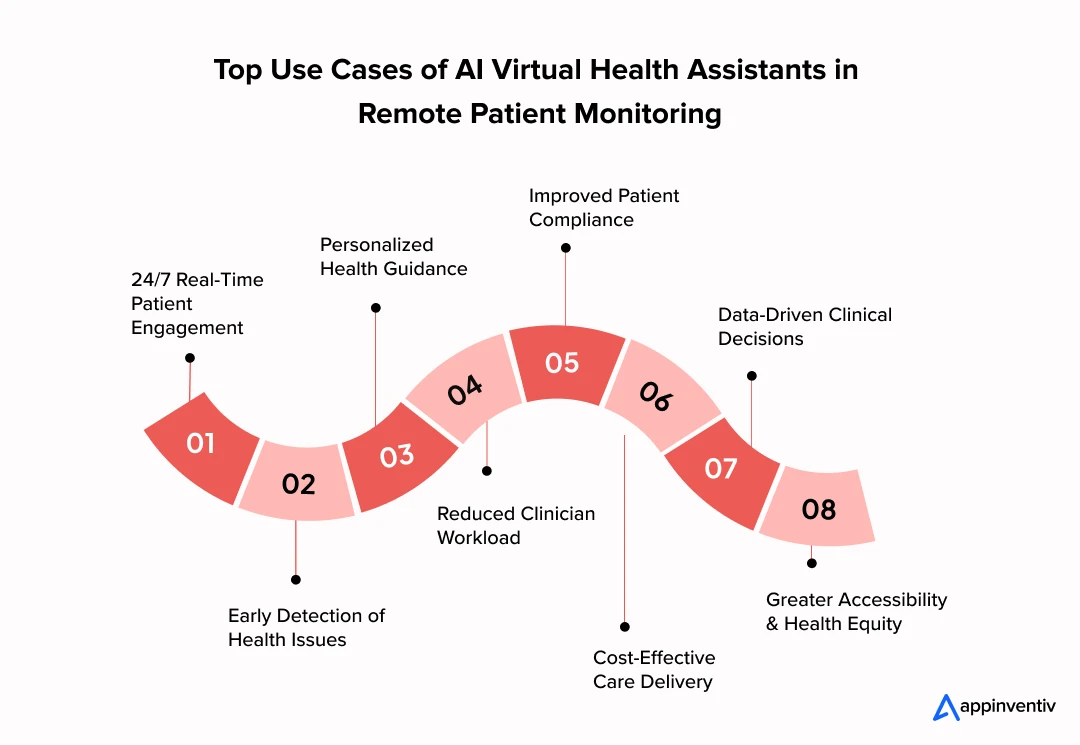
24/7 Real-Time Patient Engagement
AI virtual health assistants provide continuous patient support through real-time interactions, making proactive care available around the clock. These systems respond immediately to patient questions, send medication reminders, and monitor vital signs.
Remote patient monitoring with AI makes healthcare more accessible and consistent, significantly improving how patients experience their care. This constant availability builds stronger patient trust and engagement.
Early Detection of Health Issues
One of the core benefits of AI health assistants in remote monitoring is that they identify unusual patterns in vital signs through real-time data analysis. Virtual health assistants for remote patient monitoring alert both patients and healthcare providers about potential risks before conditions worsen. This early detection capability leads to quicker interventions, reducing hospital admissions. An AI virtual assistant in healthcare serves as the first line of defense.
Personalized Health Guidance
AI-powered virtual health assistants deliver tailored health advice based on ongoing data, personal history, and patient behavior. These systems support chronic condition management and lifestyle improvements through practical, evidence-based insights. An AI virtual assistant in healthcare adapts to user preferences to provide highly relevant support. This personalization significantly improves the quality of remote care.
At Appinventiv, we partnered with DiabeticU to develop a comprehensive diabetes management app that empowers patients to take control of their health. The app allows users to track key health metrics like blood glucose levels, medication intake, physical activity, and nutrition, all through a single, intuitive platform.
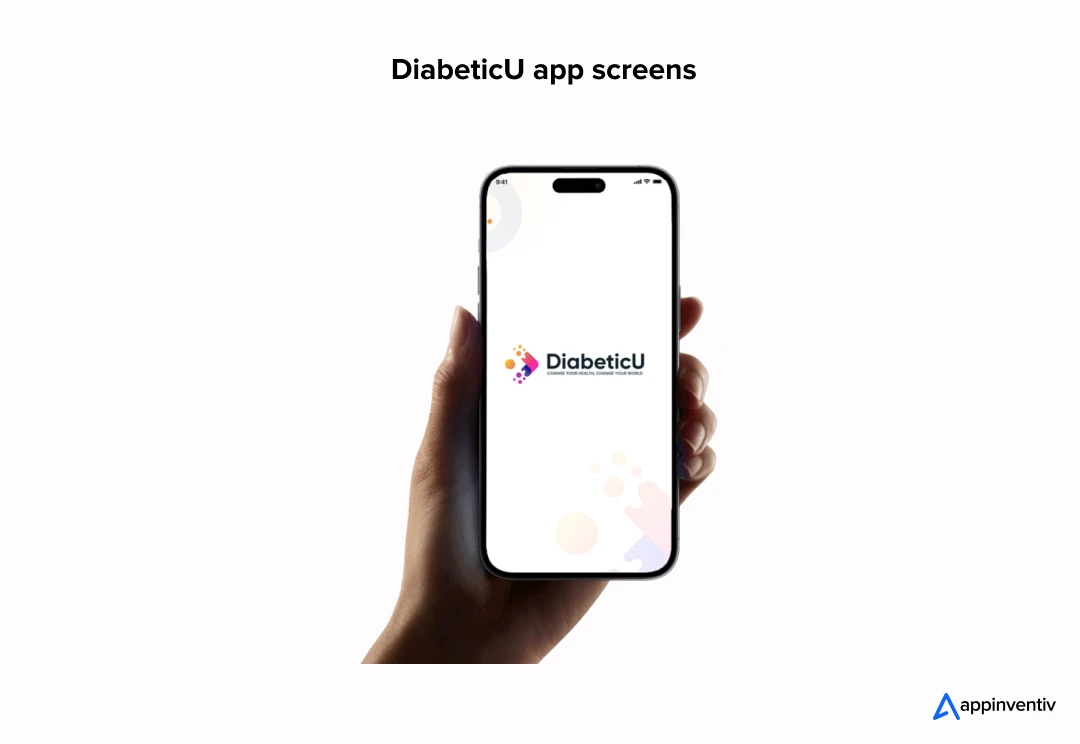
By combining real-time data tracking with personalized health insights and educational content, the app delivers tailored guidance that aligns with each user’s unique needs and progress. Features like custom goal setting, multilingual support, and caregiver dashboards ensure ongoing motivation and informed decision-making.
The result? The integration of real-time monitoring with personalized guidance has revolutionized how users manage their condition, leading to improved health outcomes and a better quality of life for individuals living with Type 2 diabetes.
Reduced Clinician Workload
AI virtual assistants in healthcare handle routine tasks like symptom triage, daily check-ins, and report generation. By taking over these administrative duties, doctors and nurses can concentrate on complex cases, boosting care efficiency. Virtual health assistants for remote patient monitoring improve workflows, reduce burnout, and optimize resource allocation.
Also Read: The Role of AI in Streamlining Triage and Improving Patient Outcomes
Improved Patient Compliance
AI virtual health assistants help patients stick to medication schedules, therapy plans, and follow-up appointments. Through reminders, gentle alerts, and motivational messages, these assistants keep patients engaged with their care regimen. This leads to fewer complications and better health outcomes. AI-powered virtual health assistants play a crucial role in creating lasting behavioral changes in patients.
Cost-Effective Care Delivery
Remote patient monitoring reduces unnecessary hospital visits by enabling early at-home interventions that significantly cut costs. AI virtual assistants in healthcare decrease manual monitoring requirements and optimize care delivery. This creates better ROI for providers while lowering expenses for patients. AI in remote patient monitoring supports sustainable, value-based healthcare models.
Data-Driven Clinical Decisions
AI-powered virtual health assistants gather, analyze, and present patient data to help clinicians make well-informed decisions. This continuous feedback loop allows for customized treatment plans and ongoing effectiveness monitoring. AI virtual health assistant technology converts raw data into practical insights. The outcome: smarter, faster, and more precise care.
Also Read: How AI is Empowering Clinicians with Smarter Decision-Making
Greater Accessibility & Health Equity
AI virtual assistants in healthcare extend access to underserved and rural communities, delivering care where human resources are scarce. With virtual health assistants for remote patient monitoring, patients receive quality attention without requiring in-person visits. Remote patient monitoring with AI bridges healthcare gaps and promotes equity.
Top Real-Life Examples of AI-Powered Virtual Healthcare
Healthcare organizations worldwide are discovering practical applications for artificial intelligence that genuinely improve patient care and operational efficiency. These real-world examples demonstrate how companies are successfully deploying intelligent systems to address specific healthcare challenges.
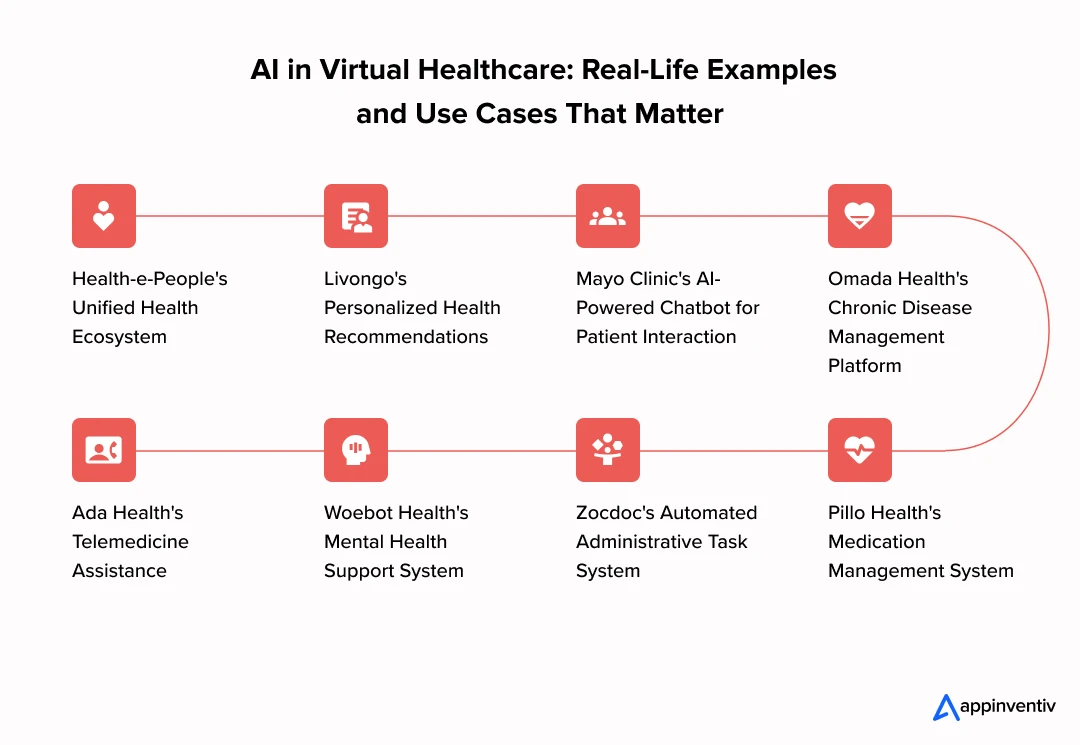
Health-e-People’s Unified Health Ecosystem for Users, Caregivers & Researchers
When Health-e-People tackled the problem of scattered health information, they knew they needed a solution on a larger scale. Their goal was ambitious: to build a platform that could integrate data from more than 200 different devices and apps. They wanted to provide people with a comprehensive picture of their health, keep them connected to their care teams, and enable them to contribute to medical breakthroughs by sharing what they learned.
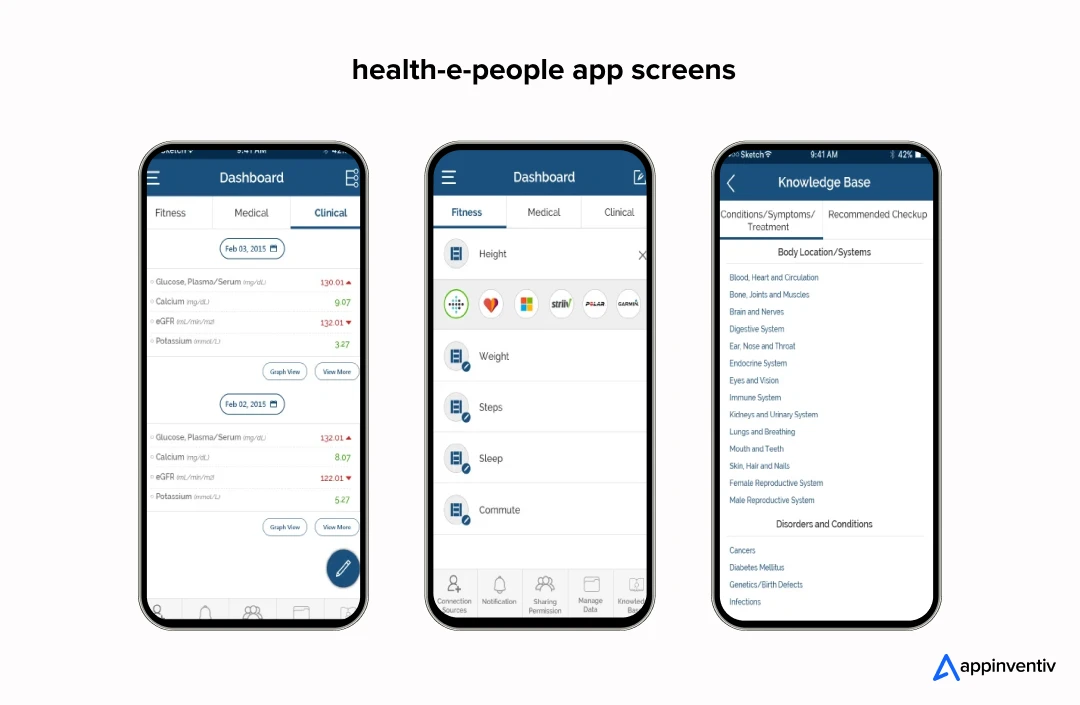
Working with Appinventiv, they developed a sophisticated health platform that does exactly that. It pulls information from multiple sources, runs advanced predictive and prescriptive analytics, and facilitates collaboration among patients, caregivers, and researchers. The real magic happens when all that raw data gets turned into clear, actionable health insights that people can actually use. Plus, it handles secure data sharing for clinical research.
Users have responded enthusiastically to the platform’s clean design and useful analytics. But what really stands out is how it’s advancing healthcare research by anonymizing user data and sharing it with medical researchers. This creates a direct connection between the health tracking people do every day and the medical innovations that could help everyone.
Livongo’s Personalized Health Recommendations
Livongo, acquired by Teladoc Health, has established itself as a chronic condition management leader by using AI to deliver tailored health guidance for diabetes and hypertension patients. They integrate virtual assistants for healthcare that analyze data from connected glucose meters and blood pressure monitors to provide immediate, personalized feedback.
The system goes beyond simple monitoring by offering specific lifestyle recommendations and medication reminders, helping patients achieve measurable improvements in their health outcomes.
Mayo Clinic’s AI-Powered Chatbot for Patient Interaction
Mayo Clinic deployed conversational AI through its “Mayo Clinic Care” mobile application to handle routine patient inquiries efficiently. Users can ask questions through a healthcare chatbot, receive symptom guidance, and get pre-visit preparation assistance without waiting for a human staff member.
The AI-driven virtual assistant also manages appointment scheduling and sends visit reminders, significantly reducing administrative workload while improving patient satisfaction scores.
Omada Health’s Chronic Disease Management Platform
Omada Health combines human coaching with artificial intelligence to support patients managing diabetes and hypertension. The Omada Platform connects wearable devices, smartphone apps, and AI analytics to track blood sugar, weight, and activity patterns.
When implementing AI in virtual health assistants, Omada focuses on preventive interventions that help patients avoid emergency room visits and expensive complications through early detection and lifestyle modifications.
Ada Health’s Telemedicine Assistance
Ada Health developed an advanced diagnostic support system that enhances virtual consultations through AI-powered health assistants for telemedicine. The Ada Health Platform gathers comprehensive symptom details and medical history before appointments, enabling physicians to focus on treatment rather than preliminary data collection.
This kind of application of AI-powered virtual health assistants has proven particularly valuable during telehealth appointments, where time efficiency directly impacts patient access to care.
Woebot Health’s Mental Health Support System
Woebot Health addresses the growing demand for mental health services through an AI chatbot trained in cognitive behavioral therapy techniques. The use of AI in mental health provides immediate support for anxiety, depression, and stress management when traditional therapy appointments aren’t available.
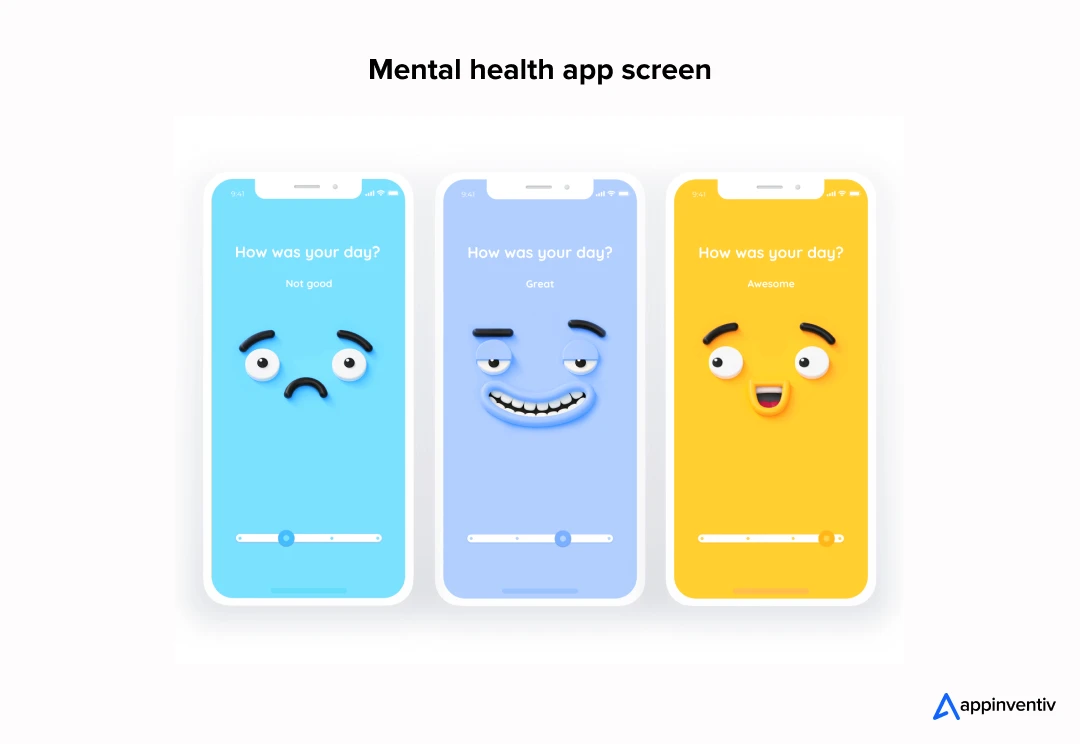
Users can access mood tracking tools, coping strategies, and guided exercises anytime, making mental health support more accessible and affordable for people who might otherwise go without help.
Zocdoc’s Automated Administrative Task System
Zocdoc streamlined healthcare administration by automating appointment booking, insurance verification, and patient intake processes. Zocdoc app utilizes AI to handle routine administrative work that typically requires staff time, allowing medical offices to redirect human resources toward direct patient care. The system reduces scheduling errors and improves appointment availability by managing complex calendar coordination automatically.
Also Read: How Much Does it Cost to Develop a Doctor Appointment App Like ZocDoc?
Pillo Health’s Medication Management System
Pillo Health developed a voice-activated medication management system that addresses the serious problem of medication non-adherence. Pillo Health’s Medication Management System leverages AI to provide personalized reminders, track when patients take their medications, and identify potential drug interactions.
The system can connect patients directly with healthcare providers when adherence issues arise, helping prevent hospitalizations caused by missed doses or medication errors.
Challenges of Implementing Virtual Health Assistants in Remote Patient Monitoring
Virtual health assistants show tremendous promise for transforming healthcare delivery, but implementing these advanced systems comes with significant obstacles that require careful planning and strategic solutions. Let’s take a look at some of the key Challenges of AI-powered virtual health assistants and solutions to overcome them.
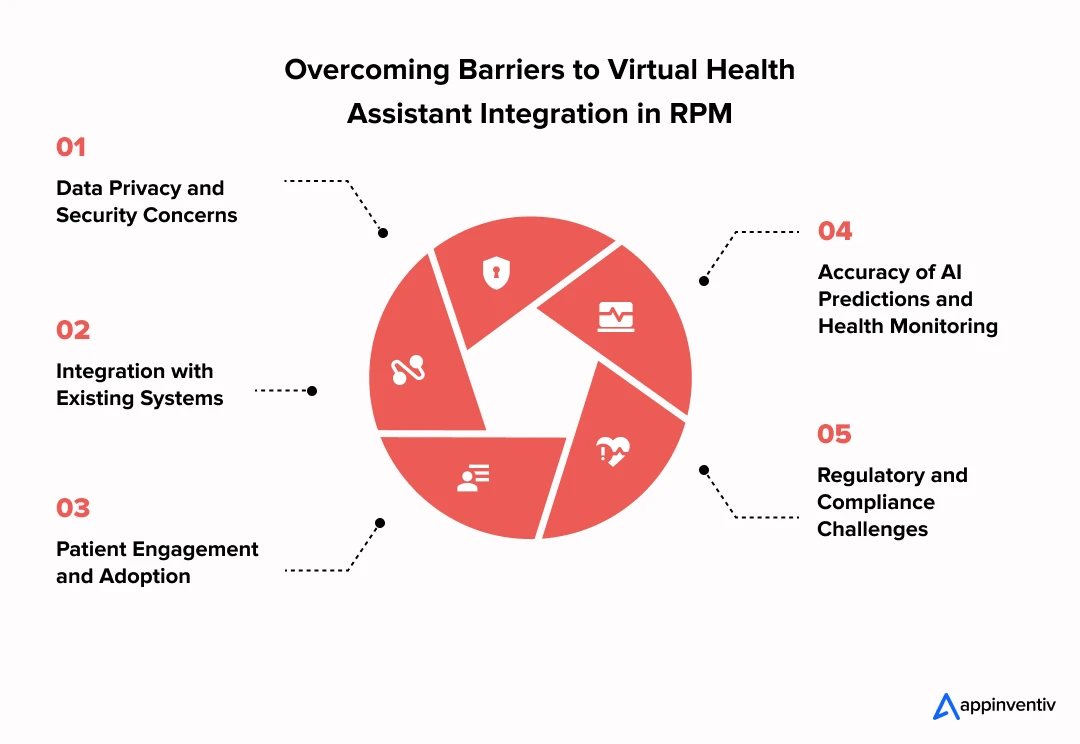
Data Privacy and Security Concerns
Challenge: The use of AI-powered virtual health assistants raises critical concerns around patient privacy and data security. As these tools handle sensitive health information, healthcare organizations must carefully comply with stringent regulations such as HIPAA and GDPR, all while ensuring transparency and maintaining patient trust in digital care experiences.
Solution: Healthcare providers need comprehensive security frameworks that include end-to-end encryption, secure cloud storage, and regular vulnerability assessments. Partnering with cybersecurity specialists who understand healthcare regulations helps ensure both compliance and patient data protection.
Integration with Existing Systems
Challenge: Most healthcare facilities rely on legacy systems that weren’t designed to work with modern AI technologies. Getting an AI health assistant for remote care platforms to communicate effectively with existing electronic health records and clinical workflows often requires significant technical restructuring.
Solution: Successful integration requires careful planning and phased implementation. Healthcare organizations should prioritize vendors who offer proven interoperability solutions and provide comprehensive testing environments before full deployment.
Patient Engagement and Adoption
Challenge: Many patients struggle with technology adoption, particularly older adults who may find AI interfaces intimidating or impersonal. Successful AI-powered virtual assistants in healthcare for patient engagement depend heavily on user acceptance and comfort levels.
Solution: AI-based user experience design becomes critical for patient acceptance. Simple, intuitive interfaces combined with adequate training and ongoing support help patients feel confident using these tools. Maintaining human touchpoints alongside AI assistance often improves adoption rates.
Accuracy of AI Predictions and Health Monitoring
Challenge: AI-powered virtual health monitoring and diagnostics depend on data from wearable devices and sensors that can sometimes provide inconsistent or inaccurate readings. This creates risks of false alarms or missed health events that could compromise patient safety.
Solution: Regular device calibration and maintenance protocols are essential. Healthcare providers should implement validation systems that combine AI insights with clinical oversight, ensuring that technology enhances rather than replaces human medical judgment.
Also Read: How to Overcome AI Challenges in Healthcare
Regulatory and Compliance Challenges
Challenge: Healthcare AI faces complex regulatory requirements that vary by region and continue evolving. Remote patient monitoring with AI introduces additional compliance considerations around medical device regulations, data protection laws, and clinical standards.
Solution: Organizations need dedicated compliance teams that stay current with healthcare compliance and regulations. Working with legal experts who specialize in healthcare technology helps ensure that virtual health assistant implementations meet all necessary requirements while avoiding costly violations.
Ready to simplify complexity and scale smarter?
The Future of AI-Powered Virtual Health Assistants
Remote patient monitoring is evolving toward smarter, more intuitive systems. AI-powered virtual health assistants are moving beyond simple data collection to become proactive healthcare partners that predict problems and deliver personalized care experiences.
Next-generation healthcare AI will use advanced language models to handle complex patient conversations naturally. An AI virtual health assistant will understand nuanced questions, provide multilingual support, and adapt communication styles to different cultural backgrounds.
These systems will excel at predictive analytics, identifying health issues before they require emergency intervention. Instead of reacting to problems, future assistants will analyze patient data patterns to prevent hospital readmissions through early detection.
The future of AI-powered virtual health assistants includes hybrid care models where technology enhances human clinical expertise. These systems will provide clinicians with data-driven insights while giving patients real-time guidance.
Virtual health assistants are positioned to become fundamental components of value-based healthcare, creating intelligent, accessible, and proactive care that anticipates patient needs rather than simply reacts to them.
Implement Virtual Health Assistants in Your Healthcare System with Appinventiv
Healthcare has moved far beyond traditional clinic walls, becoming more intelligent, efficient, and genuinely focused on patient needs. Appinventiv stands at the forefront of this shift as an AI development company that’s redefining modern healthcare delivery. Rather than simply building apps, they create adaptive digital ecosystems that learn and grow alongside patient requirements.
Their portfolio demonstrates this innovative approach through DiabetiU, which helps diabetes patients manage their condition using real-time data and smart alerts, Soniphi, a groundbreaking voice-powered diagnostic platform based on vibrational medicine principles, and Health-e-People, a comprehensive digital health management system. These platforms show how technology can remain both sophisticated and genuinely human-centered.
Appinventiv combines artificial intelligence with genuine care, precision automation with clinical accuracy, and robust data handling with ironclad security. The healthcare solutions built by their expert team deliver innovation that actually matters to healthcare outcomes. Whether organizations need AI-powered virtual assistants for remote patient monitoring, enhanced patient engagement tools, or streamlined clinical workflows, they provide scalable results.
Healthcare organizations looking to embrace the future can partner with a team that delivers strategic vision and measurable outcomes. Our healthcare app development services are tailored to meet tomorrow’s challenges with innovation, compliance, and scalability.
FAQs
Q. How much does an AI virtual assistant cost?
A. The cost of developing an AI virtual health assistant depends on several factors, but you can expect to pay anywhere from $50-200 monthly for basic individual patient systems. Healthcare facilities looking at enterprise solutions typically invest $10,000-50,000 per year. The final cost depends on the number of patients you’re monitoring, the required integrations, data storage requirements, and the level of customization involved. Most companies structure their pricing in tiers, with the per-patient cost typically decreasing as volume increases. Insurance coverage is starting to emerge for these services, especially when they’re used for managing chronic diseases.
Q. What is the function of AI in virtual health assistants?
A. AI-powered virtual health assistants handle several important jobs in healthcare. They sift through massive amounts of patient information as it comes in, identifying patterns and red flags that could signal potential health issues. These systems collect data from fitness trackers, medical devices, and patient reports, then transform all that information into actionable health advice.
The AI understands natural conversation, predicts potential health issues before they become serious, and makes routine decisions about health management automatically. What’s really impressive is how these systems get smarter over time, learning from patient results and medical research to give better recommendations.
Q. What is the role of AI virtual assistants in reducing administrative strain?
A. AI in remote patient monitoring reduces administrative burden through:
- Automated appointment scheduling and patient medication reminders
- Handling basic patient inquiries without staff intervention
- Generating reports automatically and tracking treatment plan compliance
- Sending immediate alerts to staff for critical health issues
- Reducing paperwork and data entry tasks for healthcare workers
- Minimizing human errors through consistent automation
- Ensuring reliable follow-up care protocols
Q. How are AI-powered virtual assistants improving patient care?
A. An AI virtual assistant in healthcare makes patient care better by offering personalized support around the clock. Patients can get answers to their health questions anytime, day or night. These assistants provide health education that’s tailored to each person, help patients remember to take their medications, and suggest lifestyle changes based on their specific health data.
They’re also very good at identifying early warning signs when someone’s health is deteriorating, which means doctors can intervene before things become serious. This approach leads to better health outcomes, fewer emergency room visits, and patients who feel more supported and satisfied with their care.
Q. How does AI help in remote patient monitoring?
A. Virtual health assistants for remote patient monitoring transform healthcare by continuously tracking patients outside clinical settings. These systems collect data from medical devices and sensors, monitoring vital signs, medication adherence, and daily activities. Remote patient monitoring with AI delivers instant alerts to healthcare teams when concerning patterns emerge, enabling rapid intervention.
The technology enables early problem detection, reduces clinic visits, and supports proactive chronic disease management, particularly benefiting patients with diabetes, heart conditions, and post-surgical recovery.
Q. What role does AI play in virtual health assistants for telemedicine?
A. An AI virtual health assistant plays a pivotal role in telemedicine by delivering real-time, intelligent support to patients. It leverages natural language processing (NLP) to understand medical queries, assist in symptom assessment, schedule appointments, and provide personalized health insights.
By automating these interactions, AI in telemedicine enhances patient engagement, reduces administrative burden on providers, and ensures round-the-clock accessibility in virtual care environments.


- In just 2 mins you will get a response
- Your idea is 100% protected by our Non Disclosure Agreement.
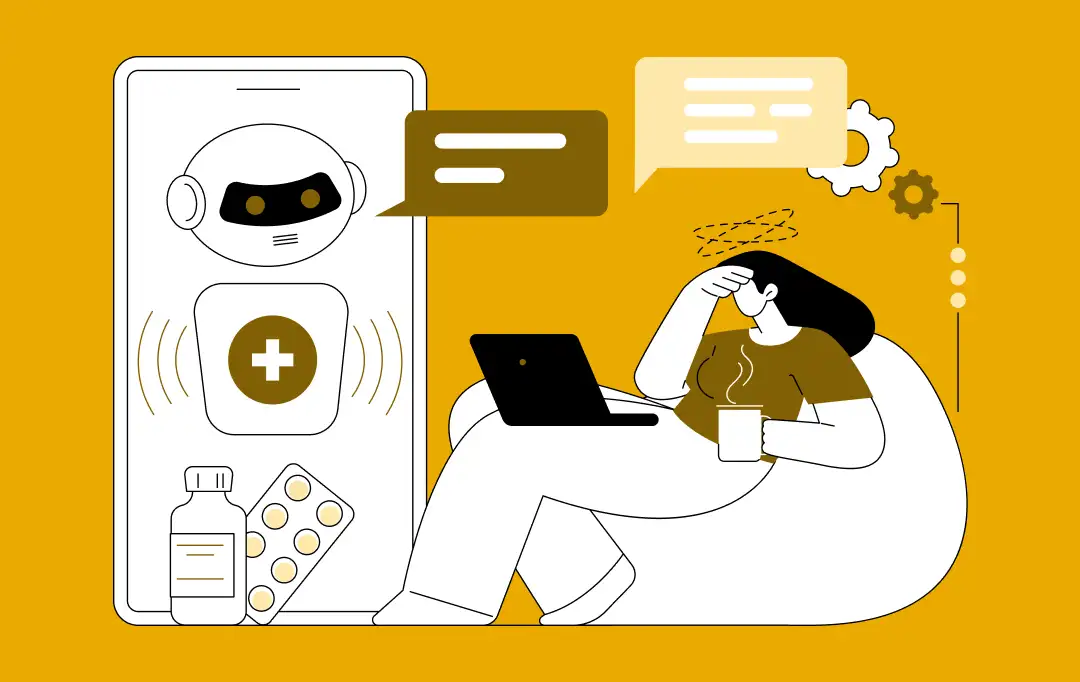
A Practical Guide to Building Your Mental Health Chatbot - Use Cases, Cost, & ROI
Key takeaways: Mental health chatbots work when they know their limits. They’re most useful as a gentle first step, not as a stand-in for real care. Good chatbot design is more about judgment than AI. Clear boundaries, calm responses, and safety matter more than smart language models. Enterprises invest in chatbots to make support easier…
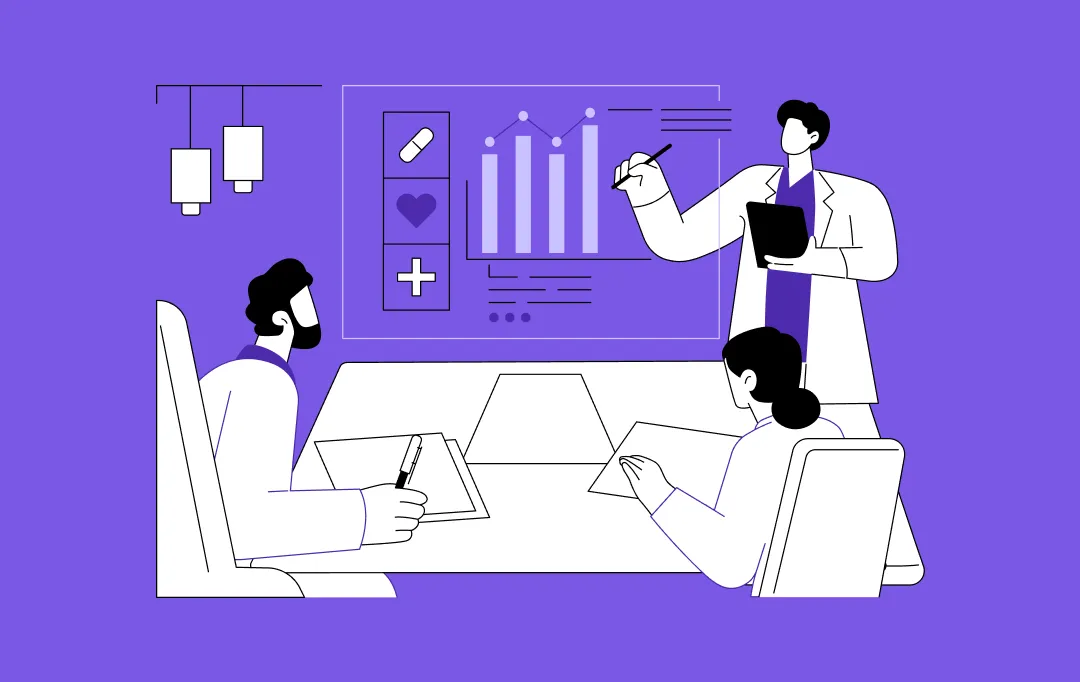
How To Hire the Right Healthcare Developers As Per Your Business Needs?
Key Takeaways The guide to the step-by-step approach to recruiting the right healthcare software developers to meet your business requirements. In-depth dissection of the major technical skills, certifications and healthcare-specific expertise required in developers. Guidelines for carrying out the evaluation of candidates using portfolios, technical interviews, and trial projects. Industry-specific ERM approaches help address regulatory,…
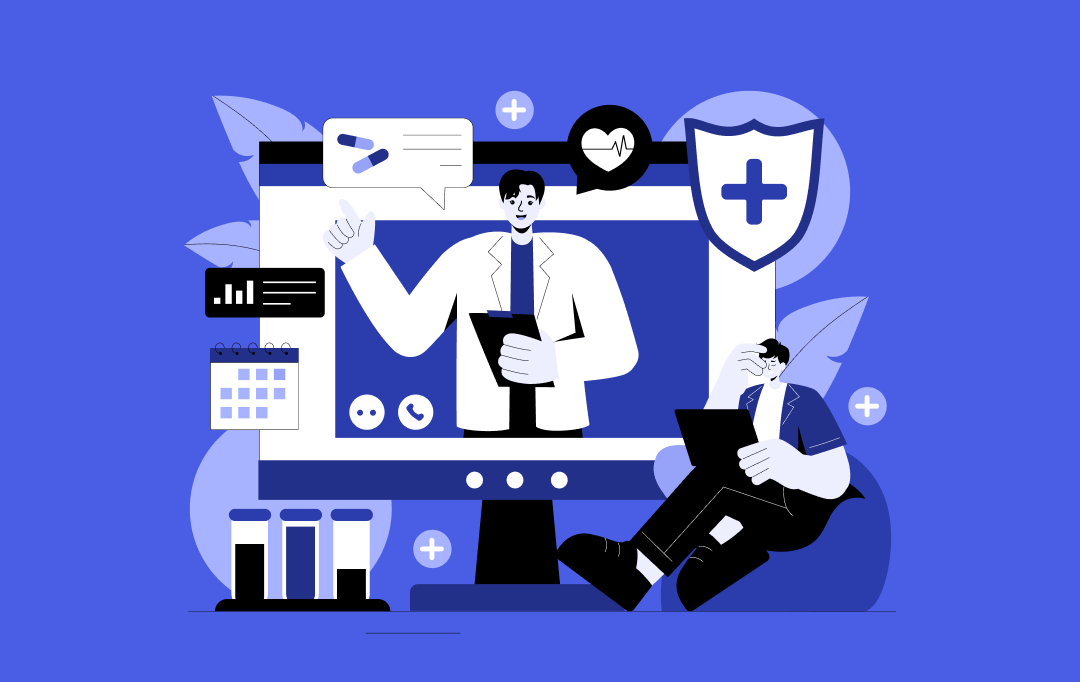
Healthcare 4.0: Redefining the Future of Connected Care and Clinical Intelligence
Key Takeaways Healthcare 4.0's ecosystem is autonomous and patient-centric, integrating AI, IoT, and cloud computing. AI-driven clinical intelligence enhances personalized care for healthcare professionals and improves patient outcomes through predictive analytics. IoT and AI are being implemented in smart hospitals to improve operational efficiency, resource management, and patient care. Connected care enables better patient empowerment…





















